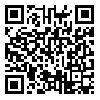Volume 15, Issue 1 (Paramedical Sciences and Military Health (Spring 2020) 2020)
Paramedical Sciences and Military Health 2020, 15(1): 18-25 |
Back to browse issues page
Download citation:
BibTeX | RIS | EndNote | Medlars | ProCite | Reference Manager | RefWorks
Send citation to:



BibTeX | RIS | EndNote | Medlars | ProCite | Reference Manager | RefWorks
Send citation to:
Hashemi T, Vahedi S, Soltani N, Khoddami M M, Hedayatnia A. The Effect of Affective Priming on Creative Problem-Solving in the Selective Sample of AJA Staff. Paramedical Sciences and Military Health 2020; 15 (1) :18-25
URL: http://jps.ajaums.ac.ir/article-1-214-en.html
URL: http://jps.ajaums.ac.ir/article-1-214-en.html
1- Faculty of Educational Sciences and Psychology, University of Tabriz, Tabriz, Iran.
2- Faculty of Psychology and Educational Sciences, Shahid Beheshti University, Tehran, Iran
3- Faculty of Educational Sciences and Psychology, Islamic Azad University, Science and Research Branch, Tehran, Iran
2- Faculty of Psychology and Educational Sciences, Shahid Beheshti University, Tehran, Iran
3- Faculty of Educational Sciences and Psychology, Islamic Azad University, Science and Research Branch, Tehran, Iran
Abstract: (1709 Views)
Introduction: One of the challenges of today's military systems is increasing the power of problem-solving and creativity. Using affective priming is one way to improve cognitive ability of problem-solving in staff and military personnel. This study aimed to evaluate the effect of positive and negative affective priming on RAT test and aimed to investigate the role of emotions on cognitive function of the creative problem-solving problem.
Methods and Materials: This study was conducted in two stages (4 days interval). Initially, 24 participants completed the Trait Problem-solving Questionnaire and the RAT test. In the second phase of the experiment or four days later, these groups were randomly assigned into three groups: positive, negative, and neutral Affective Priming Tasks. Mixed-ANOVA was used for data analysis based on the design of this experiment (pre-test, post-test with the control group).Finally, data were analyzed using SPSS software version 26.
Results: In this study, there is only a significant difference between the RAT scores of experimental and control groups (p = 0.034, α <0.05 and n = 24).
Discussion and Conclusion: The results indicate that the effects of positive and negative emotions on RAT scores are not different in two-time steps (4 days interval); however, positive and negative emotions can potentially have different results in RAT score. In addition, it is the first time that the computerized RAT test was used to measure students' creative problem-solving skills in the current study.
Methods and Materials: This study was conducted in two stages (4 days interval). Initially, 24 participants completed the Trait Problem-solving Questionnaire and the RAT test. In the second phase of the experiment or four days later, these groups were randomly assigned into three groups: positive, negative, and neutral Affective Priming Tasks. Mixed-ANOVA was used for data analysis based on the design of this experiment (pre-test, post-test with the control group).Finally, data were analyzed using SPSS software version 26.
Results: In this study, there is only a significant difference between the RAT scores of experimental and control groups (p = 0.034, α <0.05 and n = 24).
Discussion and Conclusion: The results indicate that the effects of positive and negative emotions on RAT scores are not different in two-time steps (4 days interval); however, positive and negative emotions can potentially have different results in RAT score. In addition, it is the first time that the computerized RAT test was used to measure students' creative problem-solving skills in the current study.
Keywords: Affective priming, Problem-Solving, Creative problem solving, RAT Test, Positive and Negative Affective priming.
Type of Study: Research |
Subject:
full articles
Received: 2020/06/8 | Accepted: 2020/06/19 | Published: 2020/06/19
Received: 2020/06/8 | Accepted: 2020/06/19 | Published: 2020/06/19
| Rights and permissions | |
 |
This work is licensed under a Creative Commons Attribution-NonCommercial 4.0 International License. |




